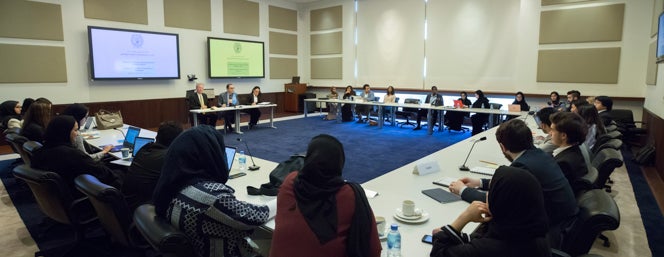Georgetown Students Test their Negotiation Skills in Crisis Simulation

Thirty ‘student diplomats’ were able to test their skills in conflict resolution and decision making at the recent annual international negotiation and crisis simulation exercise at Georgetown University in Qatar (GU-Q).
Set in a hypothetical future, the 8-hour event served as an introduction to strategic negotiations, requiring participants to work as a team to address a challenge facing the international community. During the exercise, GU-Q students simulated intensive negotiations to address longstanding political, economic, and territorial disputes in Cyprus. Participants were divided into teams to represent key stakeholders, including Greek Cypriots, Turkish Cypriots, Turks, Greeks, and the broader international community.
“As an integral component of our co-curricular experiential and applied learning at Georgetown, this year for the first time, we offered students the opportunity to extend their participation in the crisis simulation exercise into an optional one-credit course option: The International Negotiation Lab,” explained Assistant Dean for Academic Affairs, Dr. Christine Schiwietz.
“The full day simulation and week-long course engaged students in the study of diplomacy and negotiation using both theory and practice by including workshops on negotiation skills, decision-making, a substantive briefing on the current crisis and underlying political dynamics, as well as targeted readings and assignments and tools necessary to engage in negotiation in the future,” she said.
The exercise was led by Dr. Schiwietz and the Director of Studies at the Institute for the Study of Diplomacy at Georgetown University’s Main Campus in Washington D.C., Professor James Seevers. It is designed to teach students how to resolve complex issues with multiple stakeholders in a pressured environment. As each delegation received their own secret instructions on what outcome needed to be achieved, the students were given an intensive crash-course on how to negotiate mutually beneficial agreements.
“I wanted to get involved in the simulation exercise because I believe it relates to a very practical application of what we learn in our classes. We mostly read and write about politics, but to actually be able to apply that knowledge made me curious to sign up for the simulation,” explained Sara Lidetoft (SFS ‘21). “Apart from learning a lot about the Cyprus situation itself, I learned about negotiating skills and how difficult it can be to reach a consensus. I also appreciate catching a glimpse of how negotiation actually works in the real world.”
Each year, the simulation uses historical, predicted or current real-world examples of political, security, and humanitarian concerns as the focus of negotiations. Previous scenarios have included civil war and humanitarian concerns in the Democratic Republic of Congo, conflict in Kashmir, the war between Armenia and Azerbaijan over Nagorno-Karabakh, and the humanitarian crisis in Syria.